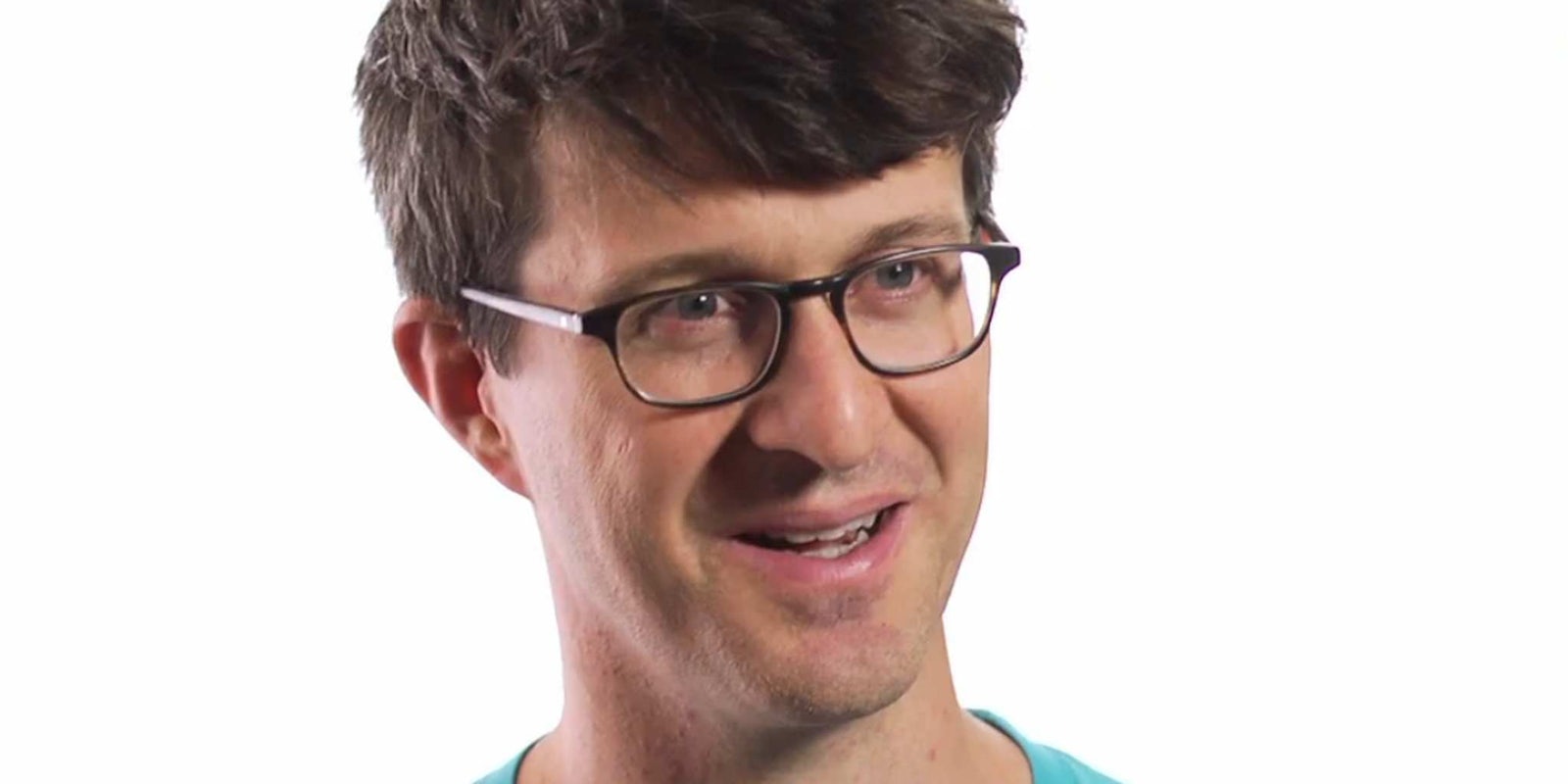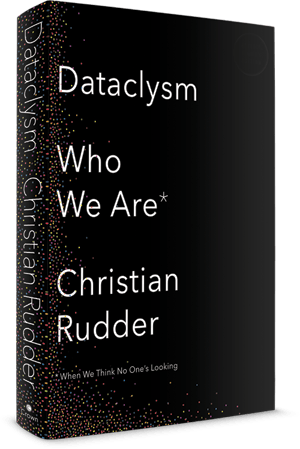Christian Rudder is cofounder of OkCupid, but he’s far more content to look at the popular dating site as a source of raw data rather than a means to find a partner. After all, Rudder is married with a child and he’s got a degree in mathematics from Harvard University. This guy loves statistics.
Visitors to OkCupid’s OkTrends blog will be familiar with Rudder’s work, which sees him dive into OkCupid’s raw masses of data to sort the signal from the noise. His success in creating highly readable stories based on numbers attached to things like sex and racism set the stage for him to release a book called Dataclysm, which tackles the math surrounding human behavior and relationships more deeply. It’s a great read.
Rudder was kind enough to chat over the phone with us leading up to Valentine’s Day. We talked all about math, romance, and psychology, and a lightly edited transcript of that conversation appears below.
The subtitle of your book is “Who we are when we think no one’s looking.” Can you elaborate on what you’re getting at there?
One of the things that’s most interesting to me in looking at how people use OkCupid is that you get this window into their psyche and how they make judgments and form opinions of one another. There are no status updates on OkCupid. There’s not much of a conventional “social network” aspect to it. People are free and without peer pressure. The idea behind the subtitle is a little Big Brother-y, but it’s lighthearted.
How much copying and pasting happens in OkCupid?
A fair amount. Maybe 20 percent of first messages from men to women are copy-pasted to some degree. I know that sounds weird, but computers make it so quantifiable. And it’s not that different from the way people act in person. When you’re single, you’re on a first date and you run through the same stories to a degree. How you got some scar. People have their schticks.
The digital nature of online data makes it easier to quantify that. When I first saw that, I thought it was fucked up that people would be so formulaic. But it’s hardly different from the way we act when meeting new people offline.
“While humanity at large can be rough, in the individual human there’s hope.”
What kinds of awful things have you learned about people based on numbers? What about the good things?
My favorite part of working at OkCupid is when I meet people who met using it, getting to hear two people’s story. Without OkCupid, that relationship might never have formed. In the aggregate, the other side is often depressing. People are just as racist, judgmental, and superficial as a cynic would expect.
You can see it play out in the data: People look at a photo, they don’t really read profile. Looks are 90 percent of the game in online dating. There’s an anti-black bias, frankly.
While humanity at large can be rough, in the individual human there’s hope.
“You can sit and talk to people and judge them from the safety of your own home without being drunk at a party.”
What does OkCupid do well that other dating sites and apps don’t do well?
I think it’s probably the biggest dating site in the country. More people find dates here than anywhere else. There are 30,000 first dates every day because of OkCupid. If you’re single and want to find someone, statistically speaking, OkCupid is the place to go.
The only metric we optimize toward is people having conversations. We don’t try to get anything else out of you. We don’t want you sticking around and clicking on page after page. Our goal is to generate as many meetings for you as possible.
We’ve never spent dollar on advertising. People tell their friends, “Hey, this shit works.” The proof is in the pudding.
What big thing do most people misunderstand about romantic compatibility?
It’s almost a meta-level of misunderstanding. We’re not trying to gauge romantic compatibility. That doesn’t play out for months and months. Some people get married before that compatibility is worked out. We don’t pretend to have solved compatibility—that’s up to you. You talk to a bunch of people and figure it out with your own mind.
If a person looks great in pictures, has awesome text, and is generally perfect on paper, then you sit down across the table from them and notice something annoying—say, an ugly sweater—that’s a turnoff. We just try to get you to that table. You take it from there.
I think eHarmony does the industry a disservice [by claiming to have solved romantic compatibility]. Romantic compatibility is a mystery no one’s solved. We don’t want a prescriptive matchmaker vibe. People know what they like.
You’re also in the band Bishop Allen. Is there any crossover? Does Internet romance math affect your music? Does your music affect your Internet romance math?
It’d be perfect for my brand if they seamlessly interacted, but they don’t. Music, for me, is not a natural thing. It’s all about sitting down and spending a lot of time in front of ProTools. That was how Bishop Allen made music. Analyzing data is the same, except we’re using Excel instead of ProTools. Bishop Allen is in some ways like that—repetition, takes, layering, iteration, as cold and corporate as that sounds.
OkTrends is awesome. How did you start blogging about the statistics attached to matchmaking?
I’m still cooking a post right now. It gets harder to do. I’ve done maybe 22 of them, and then the book. Dataclysm was pretty much everything I had to say, but there’ll be another post or two.
We started the blog to let people know what we were doing. We realized the things we were talking about around the office were interesting to the world outside OkCupid, but not everyone needs a dating site. For the vast majority, that’s irrelevant. But we needed to let people know it was out there, and the blog was a great way to get people who weren’t intrinsically interested in dating to talk about race, sex, age. It made it very easy to get people talking, and it’s a vehicle for transparency and publicity.
“Romantic compatibility is a mystery no one’s solved. We don’t want a prescriptive matchmaker vibe. People know what they like.”
Is online dating ultimately good or bad for humanity?
Every single thing on earth has good and bad attached to it. It all comes down to “no such thing as free lunch.” The major downside of online dating is that there can be too much choice. There’s always someone better, so why take any relationship seriously?
The Internet is also very superficial. When it comes to online dating, your picture is 90 percent of the deal. If you don’t take good pictures, you’re at an immediate disadvantage. Even if you actually have a great personality. Those are real things, what can I say? Furthermore, the everyday user totally understands these things.
But the tremendous amount of choice is also an upside. If you’re looking for anything particular, you can find it on OkCupid. Instead of choosing a life partner from among your 100 best friends like the old days, you can choose from 250,000 New Yorkers, and we can help you sort it and organize it any way you want. The world is your oyster.
You can sit and talk to people and judge them from the safety of your own home without being drunk at a party. You can set up dates at the bar next to your house. Online dating is very safe. It’s also very convenient. With how busy people are these days, I almost shudder to think what it’d be like to organize your life to include dating as well. OkCupid lets you spend five minutes here, five minutes there.
Screengrab via BigThink

